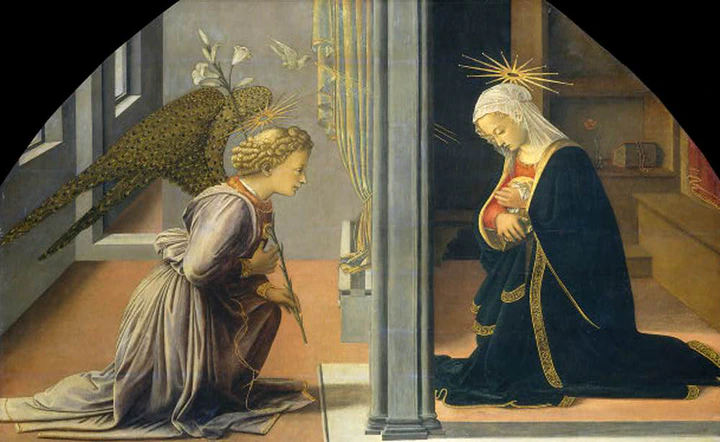Reginald Garrigou-Langrange, OP, on extraterrestrial life
 Fra Filippo Lippi, ‘The Annunciation’
Fra Filippo Lippi, ‘The Annunciation’Quotation taken from: Reginald Garrigou-Lagrange. Christ the Savior: A Commentary on the Third Part of St. Thomas’ Theological Summa. United States: Herder Book Company, 1950.
We may also say: 2. We do not know whether there are any other heavenly bodies suitable for human habitation, which are inhabited.
On this point both the positive sciences and theology can offer only hypotheses. Therefore it is not on conjectural grounds that the testimony about the Incarnation must be rejected; namely, the testimony of Christ, of the apostles, of so many martyrs, of the Catholic Church must be rejected concerning the Incarnation. This testimony is confirmed, indeed, by miracles and the wonderful life of the Church, which is fruitful both morally and spiritually in all good works.
If some of the other heavenly bodies are inhabited by human beings, God has not deemed it opportune to reveal this fact to us. Some say, if perhaps there are others inhabited, then these human beings are either in the purely natural state, or there was no case of original sin among them, or if there was, then they were regenerated in some other way than by the Incarnation. There is nothing intrinsically repugnant in all these views. It is difficult to say, however, whether these opinions can be reconciled with the free decree of the Incarnation in its relation to the human race. For revelation speaks of the human race as it exists on this earth.
Whatever is the fact about these gratuitous hypotheses, Christ, as the incarnate Word of God, is the culmination of the whole of creation, and, just as He is the head of the angels, at least as regards accidental grace, so He could be such with reference to human beings who might be living on some of the other heavenly bodies. Concerning these things and many others, we have no knowledge, and there is no need for us to stop and discuss them. Some men seem to be of the opinion that on other heavenly bodies perhaps there are rational animals of another species than man. But this seems to be false, for the term “rational animal” seems to be not a genus but the ultimate species, according to the principle of continuity; for the highest in the lowest order, for instance, the sensitive life, touches the lowest in the highest order, namely, the intellective life. Hence there is no conjunction of the highest in the sensitive life with the lowest in the intellective life, except in one species, and this is not susceptible to either increase or decrease.
Finally, it must be noted that even if the world were the mathematical center of the universe, this would be no reason why God should choose it for the Incarnation. Thus Christ was not born in Jerusalem, but in Bethlehem. So also St. Augustine was the greatest theologian of his time, and yet he came into the world and taught not at Rome, which was the center of the world, but in Africa. He was only bishop of Hippo.
The mathematical position of a body is a matter of less importance with reference to a supernatural mystery, which infinitely transcends the spatial order.
What has been said suffices concerning the fitness of the Incarnation.